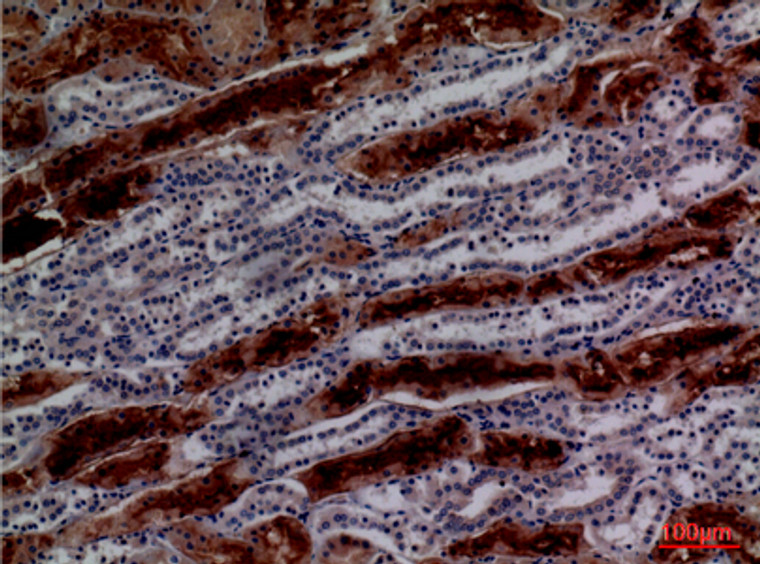| Host: |
Rabbit |
| Applications: |
WB/IHC/IF/ELISA |
| Reactivity: |
Human/Rat/Mouse |
| Note: |
STRICTLY FOR FURTHER SCIENTIFIC RESEARCH USE ONLY (RUO). MUST NOT TO BE USED IN DIAGNOSTIC OR THERAPEUTIC APPLICATIONS. |
| Short Description: |
Rabbit polyclonal antibody anti-Glutathione hydrolase 1 proenzyme (21-70 aa) is suitable for use in Western Blot, Immunohistochemistry, Immunofluorescence and ELISA research applications. |
| Clonality: |
Polyclonal |
| Conjugation: |
Unconjugated |
| Isotype: |
IgG |
| Formulation: |
Liquid in PBS containing 50% Glycerol, 0.5% BSA and 0.02% Sodium Azide. |
| Purification: |
The antibody was affinity-purified from rabbit antiserum by affinity-chromatography using epitope-specific immunogen. |
| Concentration: |
1 mg/mL |
| Dilution Range: |
WB 1:500-1:2000IHC-P 1:100-300ELISA 1:20000IF 1:50-200 |
| Storage Instruction: |
Store at-20°C for up to 1 year from the date of receipt, and avoid repeat freeze-thaw cycles. |
| Gene Symbol: |
GGT1 |
| Gene ID: |
2678 |
| Uniprot ID: |
GGT1_HUMAN |
| Immunogen Region: |
21-70 aa |
| Specificity: |
GGT1 Polyclonal Antibody detects endogenous levels of GGT1 protein. |
| Immunogen: |
The antiserum was produced against synthesized peptide derived from the N-terminal region of human GGT1 at the amino acid range 21-70 |
| Post Translational Modifications | N-glycosylated on both chains. Contains hexoses, hexosamines and sialic acid residues. Glycosylation profiles tested in kidney and liver tissues reveal the presence of tissue-specific and site-specific glycan composition, despite the overlap in composition among the N-glycans. A total of 36 glycan compositions, with 40 unique structures are observed. Up to 15 different glycans are observed at a single site, with site-specific variation in glycan composition. The difference in glycosylation profiles in the 2 tissues do not affect the enzyme activity. Cleaved by autocatalysis into a large and a small subunit and the autocatalytic cleavage is essential to the functional activation of the enzyme. |
| Function | Cleaves the gamma-glutamyl bond of extracellular glutathione (gamma-Glu-Cys-Gly), glutathione conjugates (such as maresin conjugate (13R)-S-glutathionyl-(14S)-hydroxy-(4Z,7Z,9E,11E,16Z,19Z)-docosahexaenoate, MCTR1) and other gamma-glutamyl compounds (such as leukotriene C4, LTC4). The metabolism of glutathione by GGT1 releases free glutamate and the dipeptide cysteinyl-glycine, which is hydrolyzed to cysteine and glycine by dipeptidases. In the presence of high concentrations of dipeptides and some amino acids, can also catalyze a transpeptidation reaction, transferring the gamma-glutamyl moiety to an acceptor amino acid to form a new gamma-glutamyl compound. Contributes to cysteine homeostasis, glutathione homeostasis and in the conversion of the leukotriene LTC4 to LTD4. Isoform 3: Seems to be inactive. |
| Protein Name | Glutathione Hydrolase 1 ProenzymeGamma-Glutamyltransferase 1Gamma-Glutamyltranspeptidase 1Ggt 1Leukotriene-C4 HydrolaseCd Antigen Cd224 Cleaved Into - Glutathione Hydrolase 1 Heavy Chain - Glutathione Hydrolase 1 Light Chain |
| Database Links | Reactome: R-HSA-174403Reactome: R-HSA-2142691Reactome: R-HSA-5423646Reactome: R-HSA-5579022Reactome: R-HSA-9035968Reactome: R-HSA-9664535Reactome: R-HSA-9753281 |
| Cellular Localisation | Cell MembraneSingle-Pass Type Ii Membrane Protein |
| Alternative Antibody Names | Anti-Glutathione Hydrolase 1 Proenzyme antibodyAnti-Gamma-Glutamyltransferase 1 antibodyAnti-Gamma-Glutamyltranspeptidase 1 antibodyAnti-Ggt 1 antibodyAnti-Leukotriene-C4 Hydrolase antibodyAnti-Cd Antigen Cd224 Cleaved Into - Glutathione Hydrolase 1 Heavy Chain - Glutathione Hydrolase 1 Light Chain antibodyAnti-GGT1 antibodyAnti-GGT antibody |
Information sourced from Uniprot.org
12 months for antibodies. 6 months for ELISA Kits. Please see website T&Cs for further guidance










